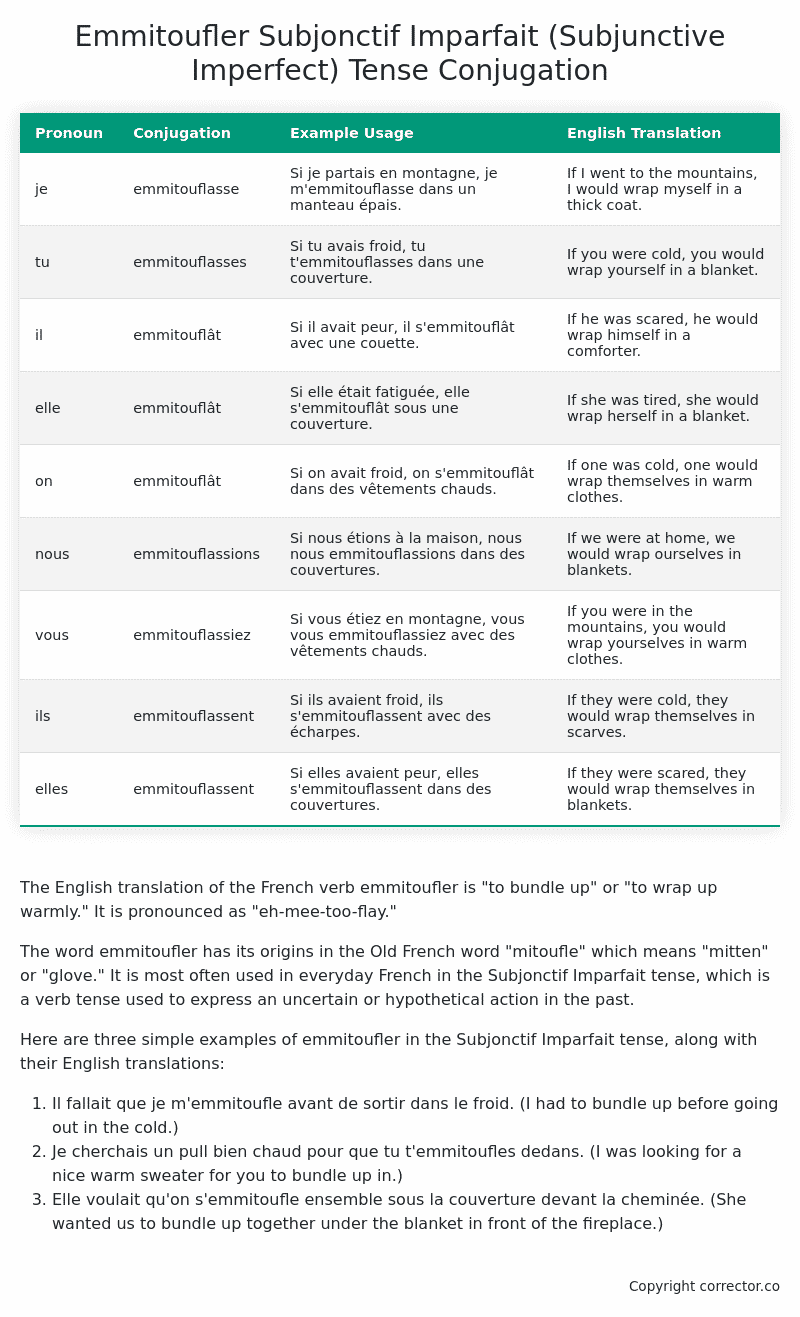Subjonctif Imparfait (Subjunctive Imperfect) Tense Conjugation of the French Verb emmitoufler
Introduction to the verb emmitoufler
The English translation of the French verb emmitoufler is “to bundle up” or “to wrap up warmly.” It is pronounced as “eh-mee-too-flay.”
The word emmitoufler has its origins in the Old French word “mitoufle” which means “mitten” or “glove.” It is most often used in everyday French in the Subjonctif Imparfait tense, which is a verb tense used to express an uncertain or hypothetical action in the past.
Here are three simple examples of emmitoufler in the Subjonctif Imparfait tense, along with their English translations:
- Il fallait que je m’emmitoufle avant de sortir dans le froid. (I had to bundle up before going out in the cold.)
- Je cherchais un pull bien chaud pour que tu t’emmitoufles dedans. (I was looking for a nice warm sweater for you to bundle up in.)
- Elle voulait qu’on s’emmitoufle ensemble sous la couverture devant la cheminée. (She wanted us to bundle up together under the blanket in front of the fireplace.)
Table of the Subjonctif Imparfait (Subjunctive Imperfect) Tense Conjugation of emmitoufler
| Pronoun | Conjugation | Example Usage | English Translation |
|---|---|---|---|
| je | emmitouflasse | Si je partais en montagne, je m’emmitouflasse dans un manteau épais. | If I went to the mountains, I would wrap myself in a thick coat. |
| tu | emmitouflasses | Si tu avais froid, tu t’emmitouflasses dans une couverture. | If you were cold, you would wrap yourself in a blanket. |
| il | emmitouflât | Si il avait peur, il s’emmitouflât avec une couette. | If he was scared, he would wrap himself in a comforter. |
| elle | emmitouflât | Si elle était fatiguée, elle s’emmitouflât sous une couverture. | If she was tired, she would wrap herself in a blanket. |
| on | emmitouflât | Si on avait froid, on s’emmitouflât dans des vêtements chauds. | If one was cold, one would wrap themselves in warm clothes. |
| nous | emmitouflassions | Si nous étions à la maison, nous nous emmitouflassions dans des couvertures. | If we were at home, we would wrap ourselves in blankets. |
| vous | emmitouflassiez | Si vous étiez en montagne, vous vous emmitouflassiez avec des vêtements chauds. | If you were in the mountains, you would wrap yourselves in warm clothes. |
| ils | emmitouflassent | Si ils avaient froid, ils s’emmitouflassent avec des écharpes. | If they were cold, they would wrap themselves in scarves. |
| elles | emmitouflassent | Si elles avaient peur, elles s’emmitouflassent dans des couvertures. | If they were scared, they would wrap themselves in blankets. |
Other Conjugations for Emmitoufler.
Le Present (Present Tense) Conjugation of the French Verb emmitoufler
Imparfait (Imperfect) Tense Conjugation of the French Verb emmitoufler
Passé Simple (Simple Past) Tense Conjugation of the French Verb emmitoufler
Passé Composé (Present Perfect) Tense Conjugation of the French Verb emmitoufler
Futur Simple (Simple Future) Tense Conjugation of the French Verb emmitoufler
Futur Proche (Near Future) Tense Conjugation of the French Verb emmitoufler
Plus-que-parfait (Pluperfect) Tense Conjugation of the French Verb emmitoufler
Passé Antérieur (Past Anterior) Tense Conjugation of the French Verb emmitoufler
Futur Antérieur (Future Anterior) Tense Conjugation of the French Verb emmitoufler
Subjonctif Présent (Subjunctive Present) Tense Conjugation of the French Verb emmitoufler
Subjonctif Passé (Subjunctive Past) Tense Conjugation of the French Verb emmitoufler
Subjonctif Imparfait (Subjunctive Imperfect) Tense Conjugation of the French Verb emmitoufler (this article)
Conditionnel Présent (Conditional Present) Tense Conjugation of the French Verb emmitoufler
Conditionnel Passé (Conditional Past) Tense Conjugation of the French Verb emmitoufler
L’impératif Présent (Imperative Present) Tense Conjugation of the French Verb emmitoufler
L’infinitif Présent (Infinitive Present) Tense Conjugation of the French Verb emmitoufler
Struggling with French verbs or the language in general? Why not use our free French Grammar Checker – no registration required!
Get a FREE Download Study Sheet of this Conjugation 🔥
Simply right click the image below, click “save image” and get your free reference for the emmitoufler Subjonctif Imparfait tense conjugation!

Emmitoufler – About the French Subjonctif Imparfait (Subjunctive Imperfect) Tense
Formation
Common Everyday Usage Patterns
Interactions with Other Tenses
Subjonctif Présent
Indicatif Passé Composé
Conditional
Conditional Perfect
Summary
I hope you enjoyed this article on the verb emmitoufler. Still in a learning mood? Check out another TOTALLY random French verb conjugation!


